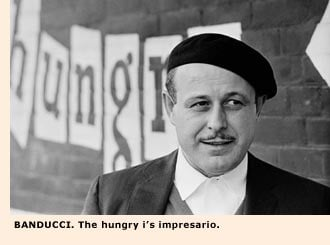Ever play the Six Degrees of Kevin Bacon game? In 1994, three college students, including an Italian American (Mike Ginelli), came up with a verbal parlor exercise in which actor Kevin Bacon is linked to “every actor in the universe” via a process of elimination. The goal is to name any generic actor in a Hollywood movie and then finally connect him or her to Kevin Bacon within six tries. The amazing part is that people usually can! Even Bacon himself, though initially put off by the concept (he thought the college kids were making fun of him), gleefully approves.
I would argue that one could also do the same, on a larger scale, via Italians or Italian Americans, and not just via Hollywood, but on everything. This goes beyond the running gag in My Big Fat Greek Wedding in which the late actor Michael Constantine, playing a proud Greek patriarch, routinely found examples of Hellenic greatness in daily life. What I mean is that – ethnic pride be damned – one really can trace major influences which Italic people have had on the world, or even on individuals. I played this game just last week when I read about the death of stand-up comedian Mort Sahl.
Let’s start with comedian Dave Chappelle, currently under fire by the transgender community for allegedly making jokes at their expense in a Netflix special. Who paved the way for Chappelle? He cites Richard Pryor and George Carlin as major influences. Who paved the way for those two comedians? Lenny Bruce, whose night-club appearances in the 1960s pushed the bar via controversial topics and language. Who paved the way for Bruce? Mort Sahl, one of the first stand-up comedians (mid-1950s) who poked fun of daily political happenings, even reading from newspapers while on-stage. And who gave Mort Sahl his first start?
Enrico Banducci.
Enrico who? Enrico Banducci, the driving force behind San Francisco’s famous “hungry i” night-club. If there was no Enrico Banducci, there’d be no Mort Sahl. And with no Mort Sahl, those ground-breaking American comedians mentioned above may never have evolved.

Born Harry Banducci in Bakersfield, California in 1922, Banducci, a violinist, moved to San Francisco in 1935 in the hopes of joining the San Francisco Symphony. He changed his first name to “Enrico” as a nod to his idol, opera great Enrico Caruso. After purchasing the hungry i from Eric Nord in 1951, Banducci started what would literally become a revolution in American night-time entertainment. The hungry i became the “go-to” place where hipsters, Beat poets, folk singers, comedians, and writers came to engage the body politic.
But, don’t take it from me. Here is a quote from Mr. Sahl, hired by Banducci in 1953: “We were set free by Enrico,” Sahl was quoted in saying in a Los Angeles Times obit after Banducci died in 2007. “He was fearless. He was his own man. I stress this as he was the last one I met.”
By “we,” Sahl means many of the performers whose careers were also launched by Banducci, among them Barbara Streisand, Woody Allen, Phyllis Diller, Bill Cosby, Jonathan Winters, Dick Gregory, Maya Angelou and yes, even Lenny Bruce. By “fearless,” Sahl meant Banducci’s larger-than-life personality, whether he encouraged Sahl and other comics to speak their minds on-stage or literally threw groups of tourists out of the club if they were too talkative. Banducci would also entertain patrons as they waited in line at the club; he played his violin for them and then playfully tipped his beret, asking for tips.
One would think that such a major force would have had his own movie biopic. Alas, all that Hollywood could drum up was the 2014 Tim Burton film, Big Eyes, where the late actor Jon Polito played Banducci in a supporting role. Predictably, just as the 1949 film House of Strangers dishonored another great Italian American from California (Bank of America founder A.P. Giannini), Big Eyes portrayed the literate Banducci as a spiritual cousin to the usual thuggish mobsters.
Interestingly, Banducci’s club wasn’t the only hot spot for innovation. Directly down the street, the late Beat poet and publisher Lawrence Ferlinghetti (1919-2021) ran his City Lights Bookstore, which launched a literary revolution in America. Also nearby is Cafe Trieste, opened by the Giotta family in 1956, considered the first coffee bar to open on the West Coast. The hungry i closed in 1970, but City Lights and Cafe Trieste continue to be tourist magnets in the City by the Bay.
So: Try the Six Degrees of Italic Separation game when you get the chance. Sometimes, it will be easy: Example, “President Joe Biden” – married to Jill Biden, whose family surname is really Giacoppo. Done! Sometimes, more mental gymnastics may be required: Charles Shultz created Charlie Brown; in 1965, A Charlie Brown Christmas was produced for television; it was co-produced by Lee Mendelson; it was Mendelson who wanted a unique musical score for this first-ever cartoon, so he hired a musician whose work he admired and recalled: Vince Guaraldi, whose trio came up with a jazz-infused score that is a holiday classic. Done!
By the way: the drummer in Guaraldi’s trio was the late Jerry Granelli, yet another Italian American. Two for the price of one! -BDC




I enjoyed the article and connecting all the dots, particularly because some of them pertain to my part of the world….the SF Bay Area. It also highlights so much of what media refuses to grasp…and that is how much we are a part of mainstream American culture, sometimes even trendsetters sometimes just trying to work it all out, and why media myths and stereotypes just blow me away…it had absolutely so little to do with my personal reality, that it is hard to feel the need to rebut the stuff. Many are the times that I have had to take a crash course in whatever to know what a given stereotype was all about!!!